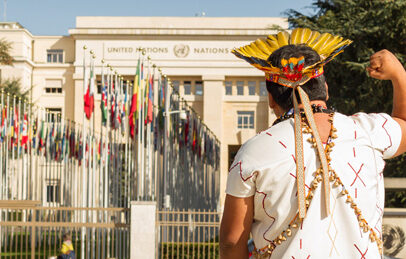Submission to the UN Working Group on Business and Human Rights inquiry on investors, ESG and human rights

Download
This report consists of a response to a call for inputs on investors, ESG (environmental, social governance) and human rights by the UN Working Group on Business and Human Rights. It focuses on the climate change-related human rights responsibilities of investors, including both investors’ responsibility to avoid contributing to human rights harms associated with climate change and the need to provide finance for ‘just transitions’ to achieve net zero greenhouse gas emissions.
This submission argues that there a need for stronger integration between the social and environmental aspects of ESG, particularly in regard to climate action. Such integration can be supported through the application of a human rights lens to climate change, in line with evolving international principles and standards.
Key messages
- There have been significant efforts in recent years to develop both the transparency and availability of data regarding climate risks and opportunities and human rights due diligence legislation. But these two regimes remain poorly integrated. This may hinder investors’ ability to adopt an approach to ESG that incorporates human rights impacts and increase litigation risks for companies.
- International instruments that promote human rights due diligence have been effective in raising awareness of human rights impacts generally, but they have been effective in clarifying the climate-related human rights responsibilities of investors and other businesses, including the need for a just transition.
- Although state agencies have pursued investigations into misleading green claims, there have been no instances to date of climate litigation to date framed in human rights terms (apart from one inquiry by the Philippines Commission on Human Rights into the responsibility of the Carbon Majors for human rights impacts of climate change, which focused on businesses instead of investors specifically).
- States should introduce specific regulations, or guidance regarding the application of existing regulations, to ensure the integrity of climate-related claims (such as that entire businesses or products or services are ‘climate-neutral’ or aligned with net zero).
- There is a recent rise in ‘just transition litigation’ against businesses and states relating to the adverse human rights impacts of initiatives that align with international climate goals. Such impacts could be mitigated through more robust human rights due diligence from investors and businesses financing or carrying out the projects.
- Investors should develop transition plans with integrated human rights considerations; set clear targets and ensure alignment with decarbonisation efforts; phase out services for oil and gas; and end financing of the exploration and expansion of oil and gas fields and oil and gas production.
- Governments should align climate-related disclosure regimes and regulation of non-state actors’ net zero pledges with the recommendations of the UN High-Level Expert Group on the Net-Zero Emissions Commitments of Non-State Entities, taking an approach that explicitly acknowledges the connection between human rights and climate change.
The submission was made on 29 September 2023. More information about the call for inputs can be found here: https://www.ohchr.org/en/calls-for-input/2023/investors-esg-and-human-rights

